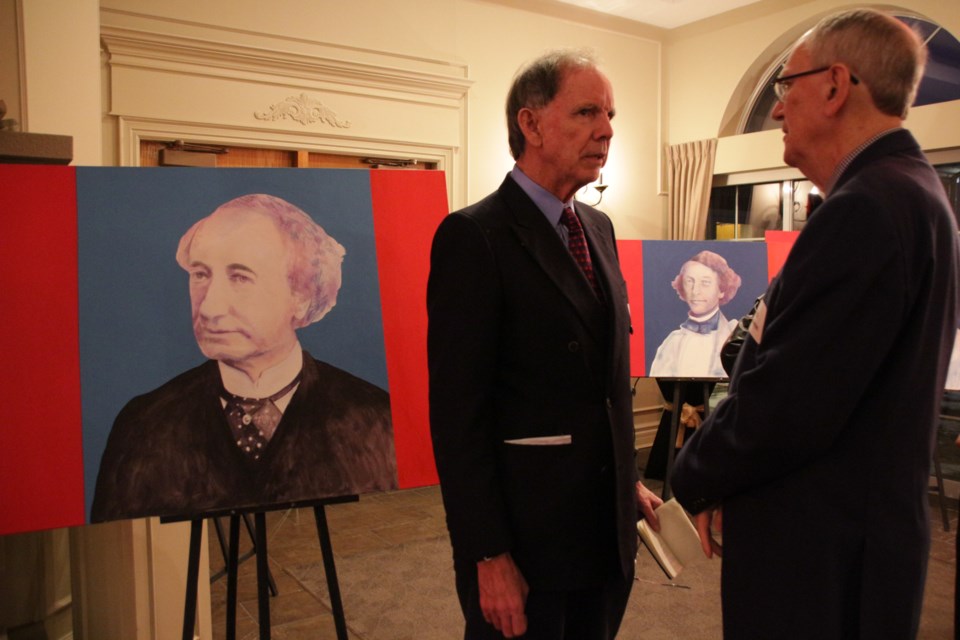Context is everything — even when judging historical figures such as John A. Macdonald.
That’s what author Donald Smith told the 234 audience members gathered Saturday night at Hawk Ridge Golf and Country Club for the sold-out Sir John A. Dinner.
As a documentary historian, Smith said the purpose of his talk was to inform and educate, and not comment on heritage or commemoration.
The dinner, which has been held in Orillia for 21 years to celebrate Canada and its first prime minister, was taking a serious look at Macdonald’s actions and interactions with First Nations people
Smith said it is crucial that in this time of truth and reconciliation, we begin with looking at Macdonald’s truth before we take steps towards reconciliation.
“We must look at the context of the period when Sir John A. Macdonald first came to Canada,” said Smith, who is professor emeritus at the University of Calgary. “It was a time of great colonial pressure.”
He said at that time First Nations were being displaced it would be easy to presume that Macdonald didn’t know much about them because those around him had been forced to move to other areas.
So did he know any First Nations people?
Yes, he did, said Smith.
From the Mississaugas of New Credit, to the Tyendinaga Mohawk to the Six Nations of the Grand River — he knew people.
And so, Smith said, Macdonald respected the Royal Proclamation and believed in the need to make treaties.
At the same time, Smith said, Macdonald believed in assimilation.
“He initiates in Parliament the Act for Gradual Civilisation and receives universal support,” said Smith, adding this Act later became The Indian Act under the Liberal government. “This was the accepted wisdom of that time.”
On the flip side, he said, Macdonald brought enfranchisement to male, property-owning First Nations members, without them losing their status.
“Compared with others, Sir John A. Macdonald wasn’t that friggin’ bad,” said Smith.
As for using this knowledge and truth for reconciliation, he said, it’s going to take years and years and years, but we have to take a time-out and study it.
That’s exactly what Wayne Williams has been waiting for.
The Chippewas of Rama First Nation member was also attending the dinner as a representative member.
“I thought it was great,” he said talking about Smith’s talk. “I’ve been waiting for 25 years for something like this to happen, for reconciliation to begin here.”
To see the Orillia Museum of Art and History (OMAH) spearheading it is great, said Williams.
“It’s always about information and education,” he said. “(Smith) is educating Canada about all that has happened to Aboriginal people of Canada. It’s a step forward in knowing what happened and reconciliation and what we can do to make things better.”
Williams said he agreed with Smith when he said that First Nations’ perspectives had never been taken into account.
“A night like this opens up ears,” said Williams. “We, as First Nations people, struggle with reconciliation, too. For something like (this) to happen, it’s a long time coming.”
It’s exactly what Tate Carruthers said he needed to move toward reconciliation as a young Canadian.
“In class, you learn about what (Sir John A. Macdonald) did to create Canada,” said the 17-year-old Grade-12 student from Orillia Secondary School. “But you’re not taught about the negative side of it.”
With reconciliation, said Carruthers, the curriculum has changed to include more First Nations perspectives.
Smith’s talk supports those efforts, said Carruthers.
“It helps me because I hadn’t learned many aspects of what happened and how brutal we were,” he said. “Events like this can help not only me to reach out for reconciliation, but to lead others towards it by opening their eyes to what happened.”
Listening to both the negatives and positives of Sir John A. Macdonald’s interactions with the First Nations is important, said Lidia Cook.
“Especially the history part that we didn’t know how it went down — now it’s coming to light,” said the Oro-Medonte resident. “I think knowledge can help people deal better with reconciliation.”
DIALOGUE IMPORTANT: OFFICIAL
The Sir John A. Dinner has been serving as a fundraiser for the Orillia Museum of Art and History (OMAH) for the last 20 years. Last year, the venue was moved to Hawk Ridge Golf and Country Club to accommodate the high demand as the event was sold out and raised $15,000.
This year, again, the event was sold out and 234 people attended Saturday night's event.
“It’s OMAH’s 20th birthday this year,” said Ninette Gyorody, executive director of OMAH, “so it’s a wonderful year to be with a speaker, such as Dr. Smith and his work on First Nations.”
It is important at this particular time in the journey toward reconciliation to continue the dialogue, she said.
“John A. Macdonald has been so vilified,” said Gyorody. “He had a vision for the nation which may not have been the best for everyone. But he was a product of his times.”
And she said Smith’s talk informed audience members exactly of what the times were: colonial.
Gyorody said having Smith speak at the dinner was a wonderful opportunity in Orillia to hear a speaker from out west, especially because of OMAH’s connection with Sir Sam Steele, who was known in the west as the leader of the North West Mounted Police.
Gyorody also acknowledged the efforts of the organizing committee and interest of the sponsors, especially Charles Pachter, who has lent three of his Sir John A. Macdonald paintings to OMAH, pledging that part of the sales proceeds will go towards the museum.
